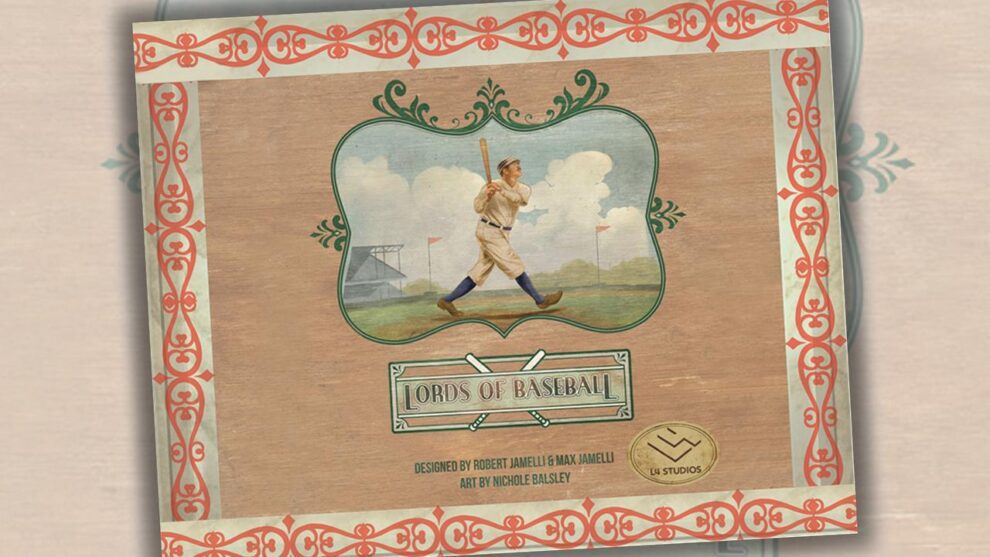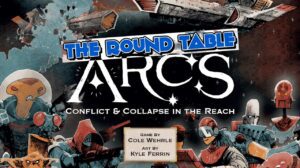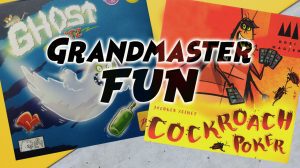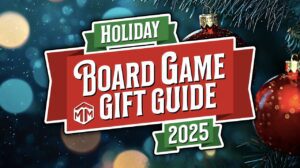Disclosure: Meeple Mountain received a free copy of this product in exchange for an honest, unbiased review. This review is not intended to be an endorsement.
While on its face, Lords of Baseball is a love-letter to the early days of the stick-and-ball, where everything had a sepia-toned luster, in reality, it’s a love letter to something else: rolling dice and consulting charts.
This might sound like a bad thing, but here’s a surprise: I like dice and I like charts. I also like simultaneous play which, for the most part, Lords of Baseball manages to pull off with aplomb.
Cards. Lots of Cards.
The game might be what some would call a CDG (card-driven game), but if you’re looking for something in the vein of Twilight Struggle or COIN, you’re likely going to be disappointed. LoB takes a more loosey-goosey approach to hand and card management.
Basically, it goes like this. You have a player board with your stats. You’ve got a money tracker, a tracker for prospects, a tracker for regular players, a tracker for your GM, Front office, and a few other stats. You add together these stats to determine your team’s quality, which we’ll come back to later.
The game is highly procedural. First, you get dealt “Spring Training” cards (3), plus additional if you have raised your farm system tracker. You can also turn in media tokens to get more cards, but you’re never going to have more than 5 going into training. Basically, you alternate playing these cards until everyone has played all their cards. They let you increase your various trackers, and get coveted “Star Player” cards, which bump your team’s quality up by one for each one you have. They’re a limited commodity, but players will sometimes send star players back to the star player pool and promote from within, so it’s an interesting little closed economy.
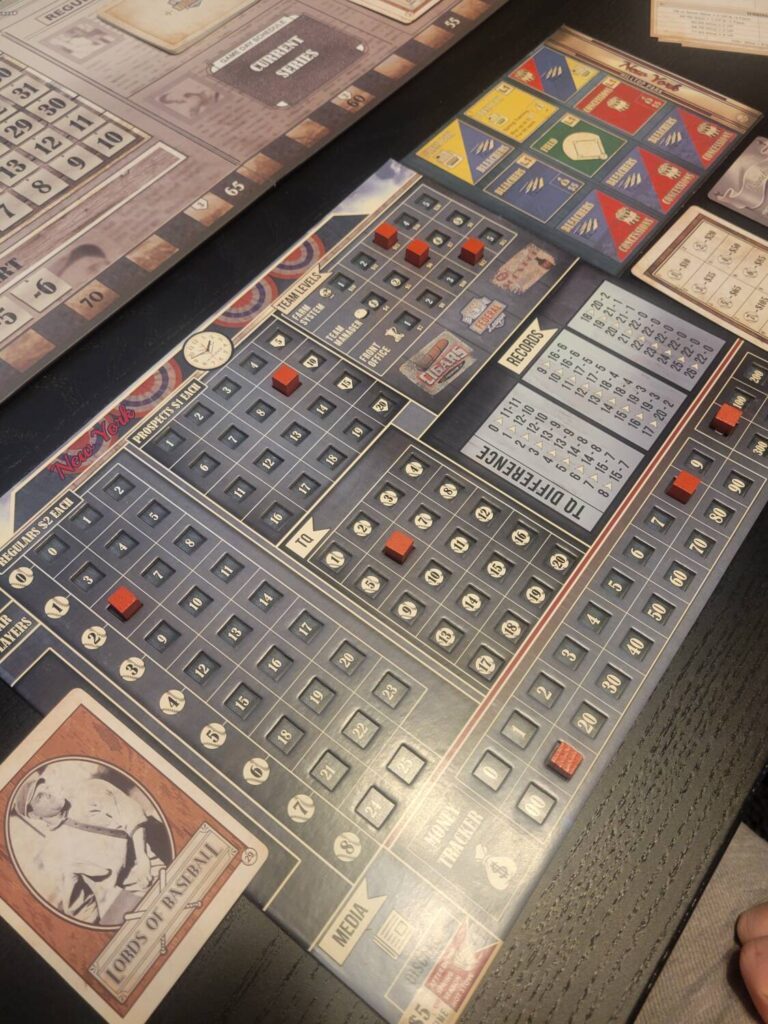
This part can be mostly played simultaneously unless there’s a conflict over those limited star players, in which case, there’s a turn order system.
After all that prep work, it’s game time.
Buckets of dice
Players then play 7 games (well, they’re technically seven 22-game series, don’t tell Greg Maddux). They’ll play each of the other teams once, and those teams will be either another player or an NPT (non-player team). In both cases, the process is similar. You’ll have a hand of 7 (8 if you sprung for an extra with a media token) cards, and you’ll play one before each game. If it’s against another player, you simultaneously reveal and resolve the higher number card first. If it’s an NPT, you just play one card and they have a fixed stat you’re rolling against. Then, you look at your quality rating. You roll a die for yourself, and one (or more with some cards) for your opponent, and then you compare the sum total of your roll and quality rating to theirs. Find the difference between the two numbers, consult a chart, and then give each player a number of wins that match the difference.
Do that seven more times and you’re golden.
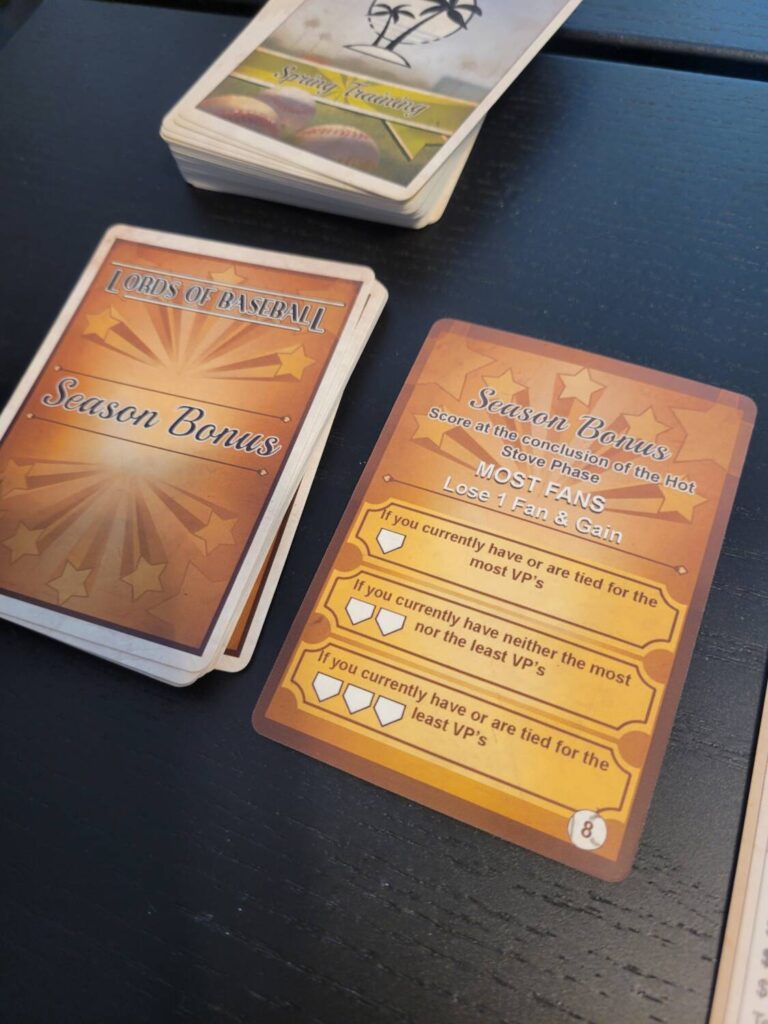
If you manage to outwin all the other players and the NPTs, you’ll get an opportunity to compete in a championship, which is basically more die rolling. The number of wins you get determines how many VPs you’ll get from a season, ranging from 1-9.
Postseason and Hot Stoves
In the postseason, you get income and pay expenses, which is some math I won’t go into here, and then you can decide to buy VP for points, and you’ll get some “hot stove” cards, which work similarly to spring training cards. However, you’ll be using them to upgrade a separate stadium board you have, as well as making more permanent upgrades to your team.
There’s more to it than that–but that’s the gist. Now, how does it feel?
Baseball been berry, berry good to me!
Does Lords of Baseball feel like managing a baseball team? Yes and no. This is not a system that rewards deep and complex analysis. You’re not poring over individual player stats, you’re managing a quality rating that’s governed by a few sliders. It can feel very difficult to actually improve your team dramatically. You upgrade your team, but slowly, and you can still occasionally be undone by bad rolling during the season.
In spite of all of that, it does feel satisfying to slowly grow your baseball program, and you do feel great when you overcome all the odds to win a bunch of games. I contrast this with Eleven, another sports team management game which excised every moment of drama from building a team and playing matchups and replaced it with pedestrian engine building activity and stat mongering. The randomness and excitement of sport is never far away in Lords of Baseball, and it’ll likely be my go-to for a game of this type, if the front office approves.


